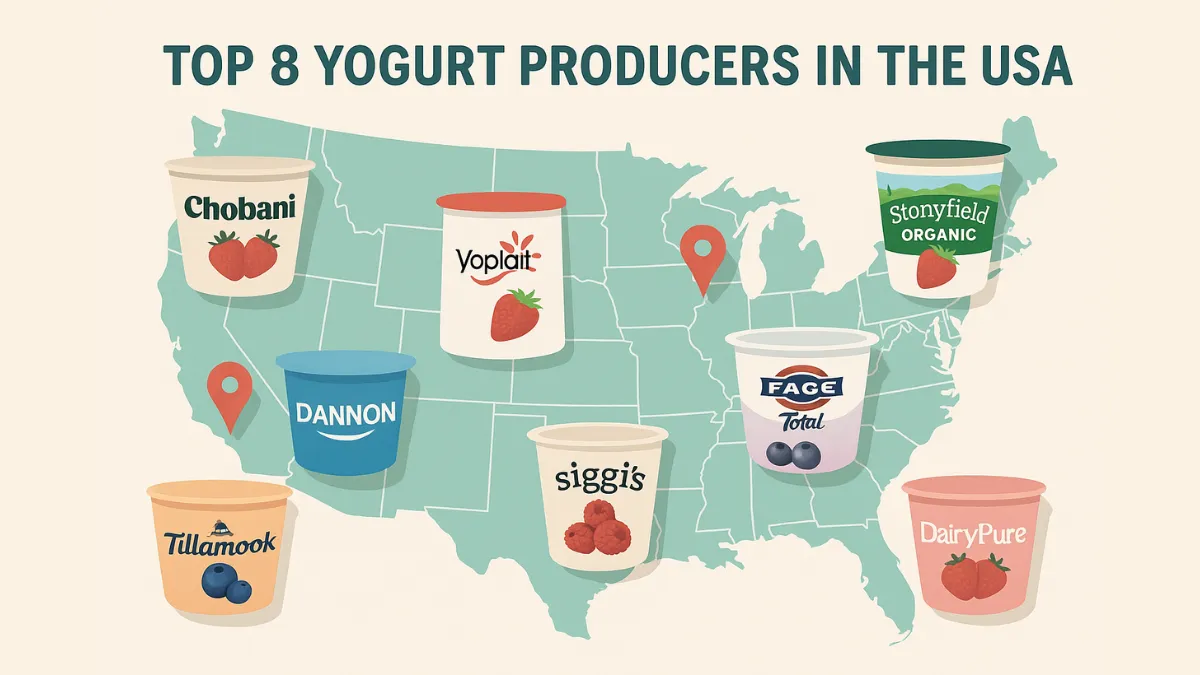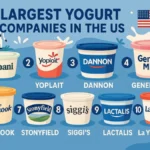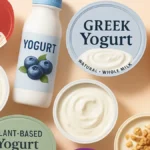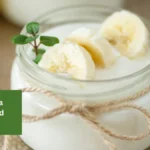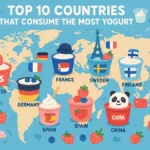Yogurt has gone from a niche health food to a daily essential in American households. Whether it’s a protein-packed breakfast, a midday snack, or a post-workout pick-me-up, yogurt is now a staple for millions. But have you ever wondered who makes the delicious, creamy goodness you’re spooning out of the fridge?
The U.S. yogurt market is packed with powerhouse brands—each with a unique story, purpose, and product line. From pioneers of Greek yogurt to organic trailblazers and indulgent treat-makers, these top yogurt companies are shaping the way we enjoy this versatile dairy delight. Let’s dive into the top 8 yogurt producers in the USA and what makes each one stand out.
Chobani
Founded in 2005 by Turkish immigrant Hamdi Ulukaya, Chobani revolutionized the American yogurt scene by popularizing Greek yogurt. What started in a small plant in upstate New York quickly became a movement. Chobani’s thick, protein-rich yogurt—free from artificial ingredients and GMOs—appealed to health-minded shoppers.
Today, the brand is known not only for its quality yogurt but also for expanding into oat milk, plant-based options, and coffee creamers. Chobani’s commitment to ethical sourcing, natural ingredients, and employee benefits (like equity and paid leave) makes it a leader in both nutrition and corporate responsibility.
Danone North America (Dannon)
As a major player in the global food industry, Danone North America—known in the U.S. as Dannon—has been making yogurt since 1942. With a portfolio that includes Activia, Oikos, and Light & Fit, Dannon has something for everyone—from gut health to low-calorie goals.
The company stays relevant by constantly innovating and supporting sustainability, from reducing carbon footprints to regenerative farming. Dannon isn’t just selling yogurt; it’s helping guide the conversation around food, health, and the environment in America.
Yoplait USA
Yoplait is a household name in the U.S., known for making yogurt fun, accessible, and family-friendly. From the classic fruit-on-the-bottom cups to kid-favorite Go-GURT tubes, Yoplait has something for every age and taste.
A part of General Mills, Yoplait keeps evolving with health trends, offering Greek-style, low-fat, and organic options. The brand has also embraced sustainability by reducing plastic waste and supporting eco-friendly farming. Its wide appeal and variety make it a constant favorite on grocery shelves.
Stonyfield Organic
If organic yogurt is your jam, Stonyfield Organic is the name to know. Founded in 1983 out of a farming school in New Hampshire, the brand has always been rooted in clean eating and environmental stewardship.
Stonyfield offers everything from organic Greek yogurt to baby-friendly YoBaby cups. What sets them apart is their commitment to family farms, non-GMO ingredients, and sustainable practices like carbon-neutral farming. For eco-conscious consumers, Stonyfield delivers purity with purpose.
Siggi’s Dairy
Siggi’s brings Icelandic tradition to the U.S. with its ultra-thick, low-sugar skyr. Launched in 2006 by Icelander Siggi Hilmarsson, the brand quickly gained traction among people tired of overly sweet, processed yogurts.
Siggi’s is all about simplicity—real fruit, minimal sugar, and no artificial junk. They’re also champions of ethical dairy practices and environmental transparency. If you’re looking for high-protein yogurt that’s as clean as it is delicious, Siggi’s delivers in spades.
FAGE USA Dairy Industry
Pronounced “fa-yeh,” FAGE is a Greek-born brand that brought authentic Greek yogurt to American shelves. Known for its ultra-creamy texture and rich flavor, FAGE uses traditional straining methods with no added thickeners or preservatives.
The Total line, especially, is loved by foodies and fitness fans alike. With a U.S. production facility in New York, FAGE is committed to quality and sustainability—from recycling waste to energy-efficient operations. Whether you use it in smoothies, dips, or desserts, FAGE is a creamy go-to.
Noosa Yoghurt
For those who love their yogurt a little more indulgent, Noosa is the perfect treat. This Australian-style yogurt, launched in Colorado in 2009, is made with whole milk, honey, and high-quality fruit purees.
Noosa’s rich, velvety texture and unique flavors—like lemon, salted caramel, and key lime—make it feel like a dessert, even though it’s made with clean, natural ingredients. The brand partners with local dairy farms and supports sustainable packaging, making it a feel-good indulgence.
Tillamook County Creamery Association
Tillamook might be known for cheese, but its yogurts are making waves too. This farmer-owned co-op has been crafting high-quality dairy since 1909, and its yogurt lineup reflects that same commitment to excellence.
Made without artificial sweeteners and with milk from hormone-free cows, Tillamook yogurts are rich, creamy, and responsibly produced. Their product range spans Greek-style to dual-flavor yogurts perfect for pairing with granola or fruit. Rooted in sustainable farming, Tillamook is a trusted brand for mindful eaters.
Choosing the Right Yogurt Brand for Your Lifestyle
Whether you’re into Greek yogurt, need something organic for the kids, or just want a rich dessert-like snack, there’s a U.S. yogurt brand made just for you. These top producers stand out not only for their flavors and textures but also for their commitment to health, sustainability, and community.
FAQs
What is the healthiest yogurt brand in the USA?
Many health-conscious consumers prefer brands like Chobani, Stonyfield Organic, and Siggi’s for their high protein content, low sugar, and natural ingredients.
Which yogurt brand is best for probiotics?
Activia by Danone is specifically formulated with live and active probiotic cultures designed to support digestive health.
Is Greek yogurt healthier than regular yogurt?
Yes, Greek yogurt typically has more protein and fewer carbohydrates compared to regular yogurt, making it a popular choice for fitness-focused diets.
Are organic yogurt brands better?
Organic yogurt brands like Stonyfield Organic and certain varieties from Yoplait use milk from cows not treated with growth hormones and avoid artificial additives, offering a cleaner label and often higher ethical standards.
